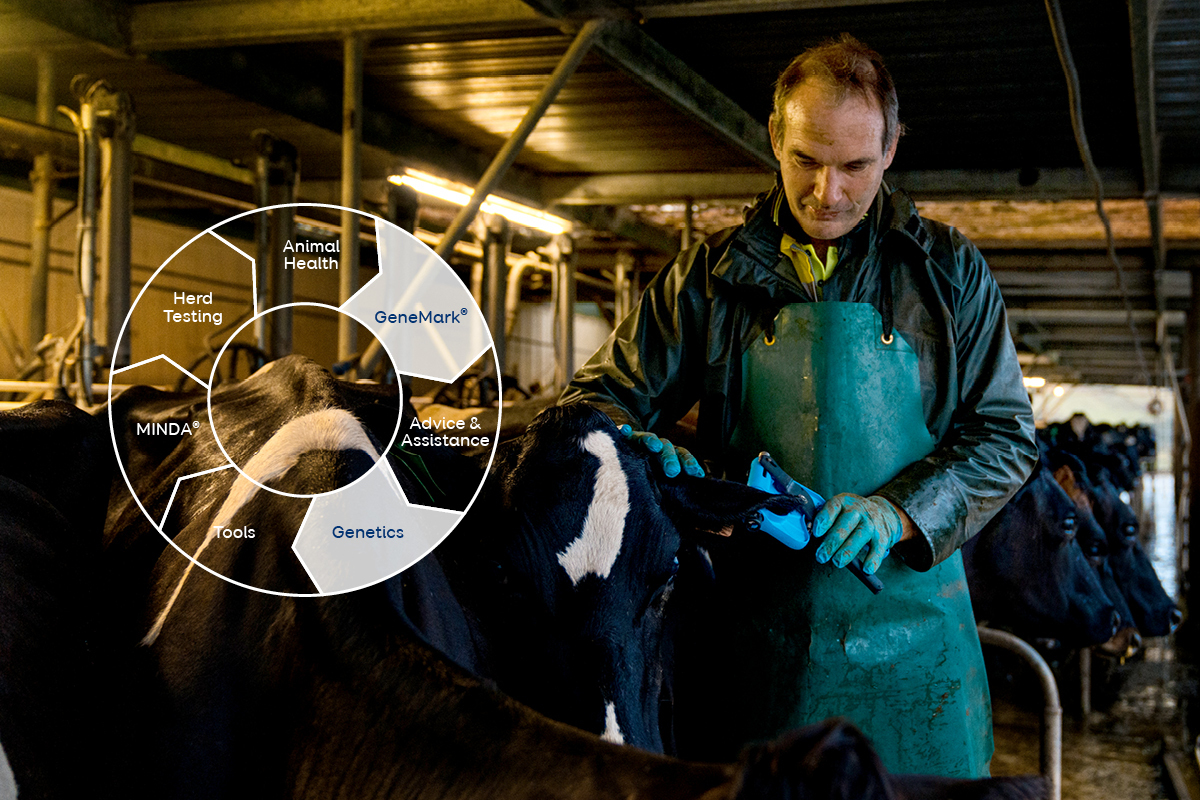Revolutionising Dairy Farming: GeneMark Genomics’ Affordable Path to a More Efficient and Sustainable Dairy Industry
By Katherine McNamara, LIC Diagnostics Business Manager

The New Zealand dairy sector plays a pivotal role in the country’s economy, contributing more than $25 billion annually in export revenue and employing tens of thousands of people.
However, as global pressures to combat climate change intensify, the industry finds itself at a critical juncture. Sustainability and efficiency are no longer optional goals but essential components for the future success of New Zealand’s dairy sector.
Over the past three decades, LIC has invested around $80 million into genomic science and genome sequencing technology, having the foresight to develop technologies that not only deliver the highest genetic merit semen on farm, but also robust data to identify the most profitable and efficient cows for better breeding and culling decisions.
Genomics is the study of an organism’s DNA, and in the context of the dairy herd, this technology is used to better understand traits that impact milk production, health, fertility, and overall performance within individual animals.
The application of genomics in New Zealand dairy herds will revolutionise breeding, improve milk production, enhance animal welfare, and ensure sustainability.
In June this year, LIC released the new GeneMark Genomics service, a simple, convenient and cost effective solution that delivers both parentage and genomic evaluation results for all eligible female animals.
The genomic evaluation component of this service includes the animal’s own genotype (DNA information) within the genomic evaluation model to deliver more reliable breeding values. The model is able to determine which genes the animal received from its parents and if they are associated with good or poor performance or desirable or non-desirable traits.
Previously the cost to generate a DNA profile suitable for genomic evaluation was significantly higher, but the development of the GeneMark Genomic technology has enabled all NZ dairy farmers affordable access to reap the on-farm benefits of genomic science.
The benefits of this technology include:
- Enhanced Breeding Efficiency
Traditionally, the estimate of an animals genetic merit has been based on their own performance (phenotype) for traits like milk production or liveweight, as well as the performance of their relatives. The best estimate of a calf’s merit was the average of the parents’ genetic merit, which had limited accuracy. Genomics enables farmers to predict the genetic potential of animals earlier and significantly more accurately.
- Increased Productivity
Breeding cows that produce more milk per unit of feed, can lower feed costs and reduce the environmental impact of dairy farming. This is especially important as the sector faces increasing pressure to adopt more sustainable practices.
- Improved Fertility and Animal Welfare
Genomics can help address fertility challenges within the dairy sector by identifying genetic markers related to reproductive traits, enabling the selection of cows with better fertility breeding values.
Genomics is also an animal welfare enhancer, enabling the identification of carriers of genetic disorders such as BLAD and CVM. Ongoing research projects are working to identify genomic predictors for mastitis and facial eczema resistance. LIC is also working hard to deliver trait information for both heat tolerance and polled helping to reduce stress within the animals.
- Improved economic gains
The economic value of genomics is clear. Genomics reduces the time and resources spent on breeding by allowing farmers to make faster, more accurate decisions. This can lead to a more productive herd with improved milk production, better health, and reduced environmental impact.
Farmers also benefit from a more predictable and stable operation, as genomics reduces the variability in animal performance. By knowing which animals are genetically predisposed to thrive, farmers can avoid costly surprises related to poor fertility, disease, or suboptimal milk production. In an industry where margins can be thin, these improvements in efficiency and productivity are invaluable.
Genomics is a game-changer for the New Zealand dairy sector, offering benefits across breeding, milk production, animal welfare, and sustainability.
As the global dairy market becomes more competitive and consumers demand higher standards, the integration of genomics into dairy farming practices will be crucial for maintaining New Zealand’s leadership in the industry.
By leveraging the power of genomics, New Zealand farmers can breed healthier, more productive cows while reducing their environmental footprint and improving profitability.
The future of the dairy sector in New Zealand is not just in the pastures but also in the lab.





